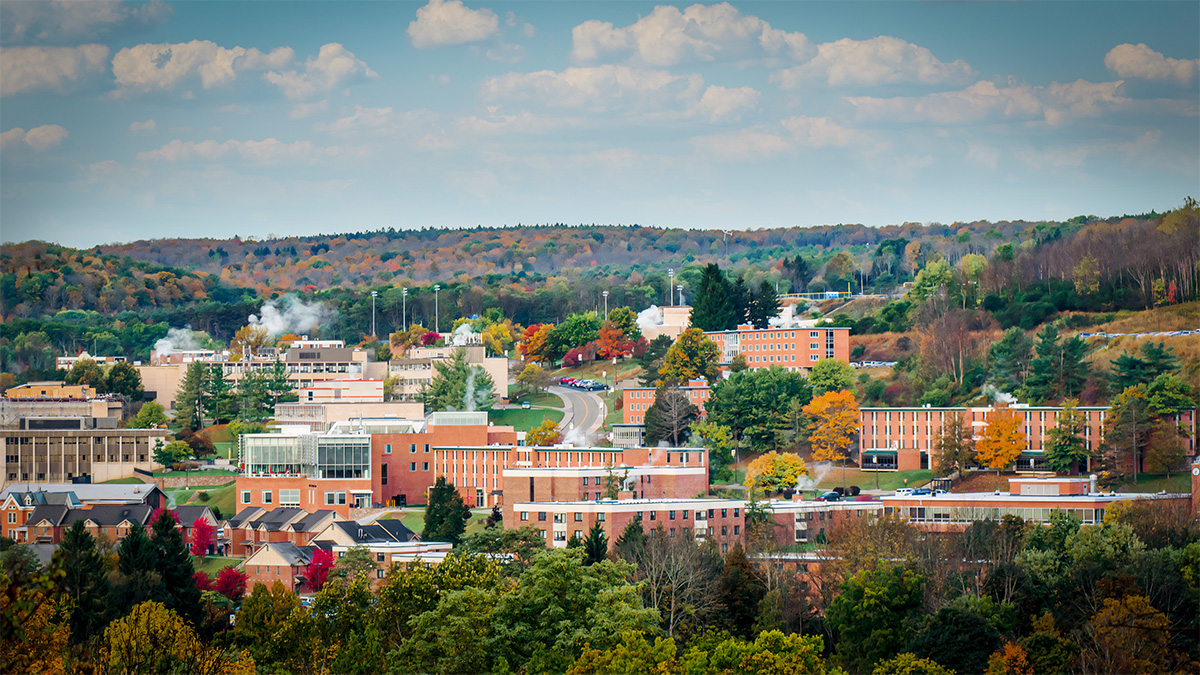
At a glance
“The times they are a changin’.”
“Not too long ago,” notes Dr. Steven J. Tyrell, vice president for student affairs at Alfred State College, “a generation was considered to be about 15-20 years. Nowadays, there are more frequent marked shifts in students’ attitudes and values. The millennial generation is comprised of more than 10 distinctly different sub-populations of students. New sub-populations can emerge as quickly as every 18 months!”

“The times they are a changin’.”
“Not too long ago,” notes Dr. Steven J. Tyrell, vice president for student affairs at Alfred State College, “a generation was considered to be about 15-20 years. Nowadays, there are more frequent marked shifts in students’ attitudes and values. The millennial generation is comprised of more than 10 distinctly different sub-populations of students. New sub-populations can emerge as quickly as every 18 months!” As the time span on generations continues to collapse, educating students becomes more challenging for institutes of higher education. With that being said, Tyrell asserts, “it is up to these institutions of higher education to face this challenge by instituting new approaches to residential living that connect the academic to the personal in the lives of emerging adults and to make the worlds of academic and student life both relevant for today’s college student.”
And that is precisely what he and his staff have done with amazingly successful results.
Recently, Tyrell and members of his leadership team, including Paul Posener, director of residential life, and Matt Ryan, interim director of sponsored programs and residential programming, presented a one-of-a-kind community development program at the College Student Personnel Association’s annual conference in Syracuse.
Titled “How Student Learning Occurs in the Residence Halls,” the program outlined how residential life staff at Alfred State developed the first method known to exist in higher education for effectively measuring how community development progresses on a residence hall floor, in a building, and across the campus.
Based upon the six I’s of Community Development, an ACUHO (Association of College and University Housing Officers) theoretical model for denoting stages of community development, this innovative theory-to-practice model has helped Alfred State analyze the data collected each semester for the past two years and then reframe how to approach residents regarding community development.
Initially developed by Kamhi and Thompson (1997) and then improved by Frankie Minor and Charles Schroeder (1998), the six I’s of community development assert that floors move through stages of community development. The early stages see the resident assistant serving as a primary peer facilitator bringing residents together; over time, this role and ownership for the floor transition to the residents on the floor. The six stages are:
- Introduction
- Interaction
- Involvement
- Influence
- Investment
- Identity
Minor, who attended a presentation on Alfred State’s program in 2008, noted that Alfred State is the only institution of higher education that he has seen successfully measure his version of the six stages of community development since the model’s release in 1998.
Tyrell reports, “Research shows that there is a direct relationship between resident interaction on the floor and the amount of community development that exists on the floor. That aspect of community development creates a form of student engagement that increases student learning and retention. Our experience with this method bears this out.”
The particular model used at ASC promotes transference of ownership from the RA (resident assistant) to the residents for managing the interpersonal dynamics on the floor. Somewhat analogous to “it takes a village to raise a child,” Tyrell posits, “it takes a floor of residents to grow a community.” Communities grow when residents take as much or more ownership for the floor than the RA does.
“Residents who take ownership of their living spaces are more likely to feel responsibility, not only for the space, but for other students,” Tyrell states. These students also tend to become invested in floor matters and have a desire to influence floor decisions. It is one of many ways Alfred State promotes civic engagement, and it is where residents can live and breathe this sense of responsibility and ownership every day. Equally important, this unique community development program has resulted in a higher number of returning students requesting to be housed in the same residence hall with the same group of residents the following year, an increase in student satisfaction (via EBI national survey results) with their residential experience, and, finally, an increase in residence hall student retention.
The staff has collected and analyzed over 20,000 reports of significant and important interactions from RAs and members of these floors over the past two years. The Division of Student Affairs has also tracked nearly 7,000 “student learning moments” as a part of these interactions during this time. The most common types of learning reported in these student-reported interactions were “feeling a sense of social/civic responsibility,” “acquiring academic skills,” “learning to effectively communicate with others,” and “developing a sense of caring about others.”
Varying degrees of community development became evident as floor and RA characteristics data were analyzed. These findings led to changes in the room assignment process, revision of RA and professional staff training in August 2008, and this year, the development of a new programming model for RAs that focuses on (a) promoting personal development skills with residents such as managing emotions or developing integrity, (b) assisting students with acquiring academic skills, (c) developing cultural competency where students are exposed to cultures different from their own, (d) fostering effective citizenship where students are encouraged to give back to their communities and better understand the meaning of civic engagement and (e) developing interpersonal skills such as conflict resolution and effective listening.
Posener notes that RAs have reported that they are also being acknowledged for the important work they do with residents and he has seen RAs talk about their roles with residents differently. RAs see themselves more as “facilitators” than the traditional labels of “programmers” (of events) and “enforcers” (of policies).
But with this success come more questions for the research team. Tyrell notes “now that we can definitely assess the level of community development on the floors, we need to understand what residents are learning as a result of living in these enriched residential environments.” As staff aggregated the thousands of “student learning moments” over a two-year period, 9-10 student learning outcome measures emerged. Student learning skills sets such as learning to communicate, learning about others different from oneself, learning to make responsible decisions, learning to develop academic skills, learning to co-exist, and learning to resolve conflict collectively point to how individuals develop a sense of self or identity. Identity development is the foundation of student development and so, it is not surprising that this mega student learning measure took front and center stage in what emerged from the data. Division staff members are now launching a three-year assessment program to measure the amount of progress that occurs in how students develop a sense of self or identity over the next two years.
In addition to the three professionals noted here, Neil Benedict, associate vice president for student life, and Dr. Jerri Drummond, associate vice president for student development, also serve on the community development and student learning outcomes assessment team for the Office of Residential Life. For more information about this program, contact Dr. Steve Tyrell, vice president for Student Affairs by e-mail at tyrellsj@alfredstate.edu or at (607) 587-3911. Yes, the times they are a changing--and so are the ways in which residence hall staff work with students on campus.
